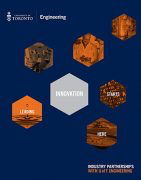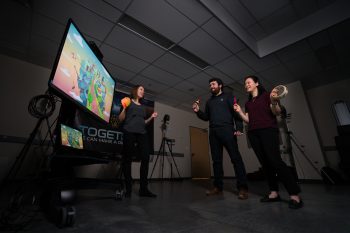Data Analytics & AI
Data analytics and artificial intelligence programs and research at U of T Engineering is reshaping processes to improve lives and generate value for people around the world.
We lead a national network of researchers from academia and industry that are designing computer chips that are optimized for artificial intelligence.

- Artificial Intelligence
- Augmented Reality
- Autonomous Vehicles
- Bioinformatics
- Communications
- Computing Systems (from Internet of Things to hardware and software)
- Computer Architecture
- Computational Medicine
- Cybersecurity
- Data Mining
- Fintech
- Intelligent Robotic Systems
- Intelligent Transportation
- Machine Learning
- Neural Networks
- Smart City Platforms
The Vector Institute strives to attract the best global talent focused on research excellence in deep learning and machine learning. Its researchers and academic partners are part of a vibrant community of innovative problem-solvers, working across disciplines on both curiosity-driven and applied research.
Centre for Management of Technology and Entrepreneurship
CMTE is a research leader in communications technology for the Canadian financial services industry. Researchers collaborate with national financial institutions to conduct research into next-generation financial technology.
Computer Hardware for Emerging Sensory Applications
COHESA is a strategic partnership between 19 leading research groups across Canada and technology companies with a long-term interest in machine learning.
Centre for Analytics and Artificial Intelligence Engineering
CARTE is the hub for collaborations and partnerships in analytics and AI at the Faculty of Applied Science and Engineering. We partner with industry and government to drive collaborative research and provide support to match funds from government sources. Through these partnerships, we also cultivate new experiential learning opportunities for students.
Southern Computing for Innovation
SOSCIP pairs academic and industry researchers with advanced computing platforms to fuel Canadian innovation within the areas of agile computing, health, water, energy, cities, mining, advanced manufacturing, digital media and cybersecurity.
Smart Applications on Virtual Infrastructure
SAVI advances Canada’s Digital Economy Strategy by strengthening the industrial base in information and communications technology (ICT) through the active participation of its partners.
Study Data Analytics & Artificial Intelligence at U of T Engineering
Our Master of Engineering students can choose from a wide range of technical emphases, including Robotics & Mechatronics and Analytics. Within the Engineering Science program, undergraduates can major in Robotics or Machine Intelligence — the first program of its kind in Canada to specialize in the study, development and application of algorithms that help systems learn from data. Undergraduates in our core engineering disciplines can pursue complementary studies in Robotics & Mechatronics through multidisciplinary minors.
 Leading innovation starts here
Leading innovation starts here
Connect with our partnerships team to discuss how a partnership with U of T Engineering can benefit your organization.

ECE professor Alberto Leon-Garcia is working towards a platform that will provide first responders in Edmonton with predictions of emergency-event occurrences in the city. The tool is being developed in collaboration with Edmonton Fire Rescue Services (FRS) and TELUS, through its Data for Good program, to bring about more effective responses and efficient resource allocation.
The occurrence of many emergency events can be predicted because people's behaviours are predictable, says Leon-Garcia.
“The pulse of the city is driven by people and their activity







